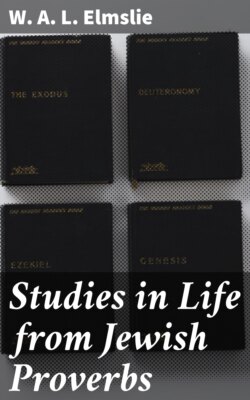Читать книгу Studies in Life from Jewish Proverbs - W. A. L. Elmslie - Страница 7
На сайте Литреса книга снята с продажи.
CHAPTER III
Forgotten Years
ОглавлениеTable of Contents
The past of human life offers an unimaginably long vista for our contemplation. Vastly many more are the years that have been forgotten than those that are remembered. Mr. Stephen Graham is therefore quite right when, in his book The Way of Martha and the Way of Mary, he insists that Christianity after nineteen hundred years is still a young religion, its doctrines imperfectly understood, its possibilities not yet unfolded. But for that matter history itself is young, since history knows at the most some six or seven thousand years of human history, and Man has been on earth hundreds of thousands of years. Glimpses of human life in those dim and distant ages are occasionally possible (as we are about to observe in the Jewish proverbs) and have a certain fascination; but their interest is apt to be overwhelmed by the disquieting ideas which the thought of so vast a stretch of time naturally raises in our mind. In comparison, our personal hopes seemed dwarfed into utter insignificance, and it is no comfort when a Psalmist (more than twenty centuries ago) suggests that to the Deity time may be a very little thing: Thou turnest man to destruction, and sayest, Return, ye children of men. For a thousand years in Thy sight are but as yesterday when it is past, and as a watch in the night. God may expend so many myriad years as seemeth good to Him in the making of sun, moon, and stars, earth and sea—what matter? But when the living bodies of men are racked with pain, when tyranny endures and love and liberty are delayed, then what is the millenial patience of God but terrifying? We cannot wait for its slow maturing. Does He not know that we who would see the salvation of the Lord in the land of the living are ready to faint?
Perhaps, however, our distress arises from the adoption of a mistaken standpoint. For, first, let the question be considered not from the point of view of God’s patience but of His greatness, and the infinitely long development will seem less dreadful. The immensity of time may then be regarded, not as a token of God’s indifference to man, but as a measure of His eternal majesty, and as evidence of an intention sublime beyond our present power to apprehend, yet not antagonistic to the value of the individual being—as indeed the author of Isaiah 40 perceived: Why sayest thou, O Jacob, and speakest, O Israel, My way is hid from my God and my glory is forgotten by my God? Hast thou not known? hast thou not heard? the everlasting God, the Lord, the Creator of the ends of the earth, fainteth not, neither is weary; there is no searching of His understanding. And, secondly, there is something to be said regarding the brevity of our bodily existence, to which an analogy will furnish the best introduction. Suppose that men were able to perceive the world of Nature only in its immensities, seeing the oceans but not the tumbling waves, seeing the plains but not each green or golden field, would they not fail to perceive an incalculably great portion of earth’s beauty? How unutterably more wonderful are all natural objects when the microscope reveals the marvel of every particle. The tree is loveliest to him who has an eye to see the perfection of each leaf or knows the miracle of its growth from a single seed or shoot. Is it not possible that something similar is true of the human spirit in its apprehension of reality? Suppose that our personality was unable to taste life except on the grand scale, so that for man a thousand years were only a passing moment, experienced only “as a watch in the night,” would not the half of life’s glory then be hidden from those who were ignorant of what one year can be? May not participation in reality on a small scale—time felt as a day, an hour, a minute—be indispensable if the human spirit is to grasp the amazing fulness of conscious life? Apparently circumscribed by the limit of our three score years and ten, are we here to learn that consciousness, even when measured in days and minutes, is of eternal worth and pure delight? For we do learn that lesson. We do discover that an instant of perfect and unselfish tenderness may be of immeasurable value. Perchance Man can never love God till he has loved his brother, never know with the Divine knowledge, until in faith, hope, and charity he has desired to win the knowledge which is in part. The cup of cold water must first be given lovingly unto the least of His brethren, or we shall never comprehend to give it into the hand of Christ Himself. “He that is faithful over a few things,” said Jesus, “shall be set over many.” Perhaps only to those who have sought to find Heaven in life sub specie temporis can life sub specie eternitatis be imparted; for to know life fully must be to know not only its infinite extension and its Divine splendour, but also the exquisite perfection of its fleeting moments.
